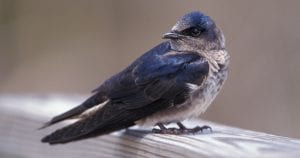
by Ryan Ponto | Sep 30, 2016 | Bird Netting
 Jammu, October 16, (Scoop News)-District authorities in Jammu ordered a probe after an Non Governmental organization (NGO), SAVE (Save animals; value Environment) conveyed that the pigeons handed over to them had rings attached to their feet and some suspicious things were written on their feathers.
Jammu, October 16, (Scoop News)-District authorities in Jammu ordered a probe after an Non Governmental organization (NGO), SAVE (Save animals; value Environment) conveyed that the pigeons handed over to them had rings attached to their feet and some suspicious things were written on their feathers.
Jammu and Kashmir Police on October 5 had apprehended three persons and impounded 150 pigeons, being carried by them in banana boxes. They were booked under various sections of Cruelty to Animals Act. The birds were handed over to the NGO for care and supervision.
It is during the care and supervision of the NGO that some suspicious things written on the feathers of the birds besides rings attached to their feet were noticed. They (NGO) immediately brought the matter into the notice of the district administration who in turn ordered a probe to enquire if the pigeons were being to be used in spying purpose.
Since early times, pigeons were being used for spying particularly during war time. Earlier this month, a pigeon apparently from across the border was taken into captivity after a letter written in Urdu and addressed to Prime Minister, Narendra Modi, was found attached to its feet by Border Security Force (BSF) personnel near Simbal Post in Bamial sector.
About Pigeon Patrol:
Pigeon Patrol Products & Services is the leading manufacturer and distributor of bird deterrent (control) products in Canada. Pigeon Patrol products have solved pest bird problems in industrial, commercial, and residential settings since 2000, by using safe and humane bird deterrents with only bird and animal friendly solutions. At Pigeon Patrol, we manufacture and offer a variety of bird deterrents, ranging from Ultra-flex Bird Spikes with UV protection, Bird Netting, 4-S Gel and the best Ultrasonic and audible sound devices on the market today.
Voted Best Canadian wholesaler for Bird Deterrent products four years in a row.
Contact Info: 1- 877– 4– NO-BIRD (www.pigeonpatrol.ca)
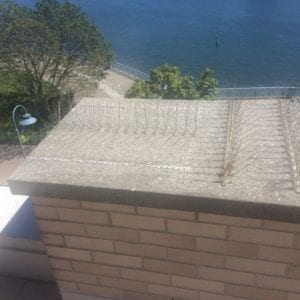
by Ryan Ponto | Sep 29, 2016 | Bird Netting
 The search is on for new owners brave enough to take it on haunted inn.
The search is on for new owners brave enough to take it on haunted inn.
The Three Pigeons Inn in Graigfechan, near Ruthin in Denbighshire , was originally a drovers’ alehouse and stead which has been on the site since the 12th century
It was rebuilt in 1777.
Today, the profitable property includes a lounge, bar and restaurant with two private ensuite holiday apartments, a lawned beer garden, outdoor veranda and beer terrace with a large car park and campsite – and around 1.8 acres of land.
The sale is under specialist business property adviser, Christie & Co and Keith Stringer, associate director at the company’s Manchester office, is handling the sale.
He said: “The Three Pigeons Inn is steeped in history and legend – even once hosting Owain Glyndwr, one of the most heroic figures in Welsh history and the last native Welsh person to hold the Prince of Wales title – as well as being home to a ghost or two, resulting in some strange sightings.”
The present owners, Paul Henri and Deborah Wilson-Henri, fulfilled a lifelong ambition in 2011 when they bought the Inn.
They have refurbished the property while maintaining original features that include open log fireplaces and beamed ceilings while also reviving the unique tradition of serving cask ales in jugs straight from the cellars.
About Pigeon Patrol:
Pigeon Patrol Products & Services is the leading manufacturer and distributor of bird deterrent (control) products in Canada. Pigeon Patrol products have solved pest bird problems in industrial, commercial, and residential settings since 2000, by using safe and humane bird deterrents with only bird and animal friendly solutions. At Pigeon Patrol, we manufacture and offer a variety of bird deterrents, ranging from Ultra-flex Bird Spikes with UV protection, Bird Netting, 4-S Gel and the best Ultrasonic and audible sound devices on the market today.
Voted Best Canadian wholesaler for Bird Deterrent products four years in a row.
Contact Info: 1- 877– 4– NO-BIRD (www.pigeonpatrol.ca)
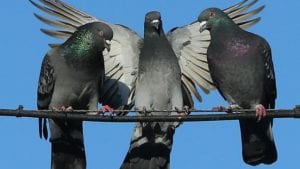
by Ryan Ponto | Sep 28, 2016 | Bird Netting
 I was reading a story in a magazine not too long ago that referred to eating pigeons. I guess back in the good old days eating pigeons or squab was as natural as eating quail or pheasant. I am glad that I did not get to participate in that ritual! I just don’t have an urge to dine on a pigeon.
I was reading a story in a magazine not too long ago that referred to eating pigeons. I guess back in the good old days eating pigeons or squab was as natural as eating quail or pheasant. I am glad that I did not get to participate in that ritual! I just don’t have an urge to dine on a pigeon.
I am sure that eating pigeons that live in the rural areas is not that bad. They feed on grain just like our other upland birds, so it is probably just like eating mourning doves. I just have these images of pigeons in parks in the cities and they do not look appetizing to me. I may not love to eat pigeons, but I sure do like to shoot them. Over the years, I have had opportunities to shoot the fast flying birds and it is quite a lot of fun. The hunts that took place were set up to eliminate birds that had become a nuisance on a farm. Pigeons are known for making a big mess!
There are other pigeons that I enjoy shooting, but they are made of clay. Shooting clay pigeons, or trap as it is called in shooting circles, is a hoot. Not only is it a great time, it is a fantastic way to keep your shotgunning skills honed. I got introduced to trap shooting my sophomore year at Kansas State University. The same guy that got me started dove hunting also encouraged me to tag along when he went trap shooting at the trap club west of Manhattan on Highway 24. I went with him on a Thursday evening shoot, and I was hooked. It also got me started in the shell reloading mode in order to keep up with the demand for all the shells I was going through.
Back during that time frame, there were trap shoots taking place in Sabetha out at the airport. I would come home occasionally during the fall, and there was usually a trap hunt that would attract a fair number of shooters. There were prizes such as hams or bacon for the winners and it was a great time. By the time pheasant and quail season rolled around, the shooting skills were honed to the point that misses on rising birds were rare. I was coming into Manhattan from the west on Highway 24 a couple of weekends ago and I drove past the trap range, which is still in operation. It brought back great memories and spurred me into action. Due to a lack of shooting opportunities over the years, I can promise you that my shooting skills have deteriorated.
Shooting trap is the perfect remedy for that problem. I plan on purchasing some birds this fall to plant and shoot so I know I need to do a little practicing. Sunday afternoon I gathered up my equipment, and my son-in-law and I headed outside to shoot a little trap. I pulled a Remington Wing Master 870 20-gauge pump to use as the firearm. Adam had never shot trap before, and I was anxious to let him have at it. I have a very simple clay pigeon thrower that tosses up to three targets at a time if you so desire. It was very inexpensive and does the job nicely. A box of clay pigeons is very cheap and contains 135 targets.
For sessions such as this, I use Estate shotgun shells, which are a cheaper shell to shoot if you are not reloading. For trap shooting, it is much more pleasurable to use the 20-gauge. It is more than adequate for the task and actually makes you a better shot. We got set up and began the session. Adam went first and he got himself set and smoked the first target. I was thrilled beyond words. It is not easy to just step up and shoot a shotgun and hit a flying target. We spent the next 45 minutes busting clay pigeons. It felt great to get back in the groove. I am telling you that smoking one of those fast flying clay targets is very satisfying.
No, you cannot eat one of these pigeons, but who really wants to eat a pigeon anyway? With the upland bird season on the horizon, get out there and shoot some trap and get back in the groove. It is a great feeling!
About Pigeon Patrol:
Pigeon Patrol Products & Services is the leading manufacturer and distributor of bird deterrent (control) products in Canada. Pigeon Patrol products have solved pest bird problems in industrial, commercial, and residential settings since 2000, by using safe and humane bird deterrents with only bird and animal friendly solutions. At Pigeon Patrol, we manufacture and offer a variety of bird deterrents, ranging from Ultra-flex Bird Spikes with UV protection, Bird Netting, 4-S Gel and the best Ultrasonic and audible sound devices on the market today.
Voted Best Canadian wholesaler for Bird Deterrent products four years in a row.
Contact Info: 1- 877– 4– NO-BIRD (www.pigeonpatrol.ca)
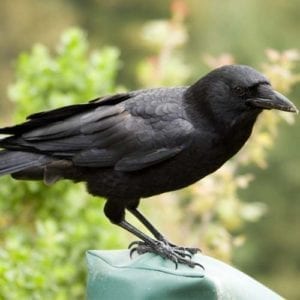
by Ryan Ponto | Sep 27, 2016 | Bird Netting
 A branch of McDonald’s has been closed in Hull and it appears to have had an unexpected effect on the city’s population of crows.
A branch of McDonald’s has been closed in Hull and it appears to have had an unexpected effect on the city’s population of crows.
People believe they are turning violent because they are unable to get their McDonald’s fix.
They claim the lack of scrap food is making the black pests more aggressive as they turn on themselves and other birds such as pigeons for nutrition.
The owner of one business at Kingston Retail Park in Hull said he found a dead pigeon which had been killed by crows.
Paul Rymer said: ‘We came into work one morning to find a pigeon all mangled and being pecked at by two crows.
A murder of crows is believed to be behind a slaughter of pigeons (Picture: SWNS)
‘They were both standing over it and we obviously scared them away.
‘When you get something like McDonald’s shutting for a few weeks it’s what happens, but there’s a lot of related problems down here with pigeon mess and litter that need to be sorted.
‘Something should be done about them.’
Other business owners believes that the crow problem, which includes an increasing number of the birds appearing, said issues with the animals pre-dates the fast food chain closure.
Phil Storey said: ‘It’s been pretty bad round here for a year now.
‘It’s a particular problem because of the litter. Nobody knows what a bin looks like these days.
They appear to have a penchant for McDonald’s
‘They seem to be attacking pigeons and each other. It’s not really putting anyone off coming down here, but it can be a bit intimidating for old people and children.’
Wildlife expert Tim Cockerill described crows as among ‘the most intelligent species’ around but said they did not generally feed on larger birds.
He said: ‘It’s quite likely that in this case the crows were scavenging on the pigeon rather than having killed it.
‘But they are very, very clever and if they see an opportunity to get something they will exploit it completely.
‘They don’t really cause any problems for humans, but there are other similar black birds that they get mistaken for, that can do.’
About Pigeon Patrol:
Pigeon Patrol Products & Services is the leading manufacturer and distributor of bird deterrent (control) products in Canada. Pigeon Patrol products have solved pest bird problems in industrial, commercial, and residential settings since 2000, by using safe and humane bird deterrents with only bird and animal friendly solutions. At Pigeon Patrol, we manufacture and offer a variety of bird deterrents, ranging from Ultra-flex Bird Spikes with UV protection, Bird Netting, 4-S Gel and the best Ultrasonic and audible sound devices on the market today.
Voted Best Canadian wholesaler for Bird Deterrent products four years in a row.
Contact Info: 1- 877– 4– NO-BIRD (www.pigeonpatrol.ca)
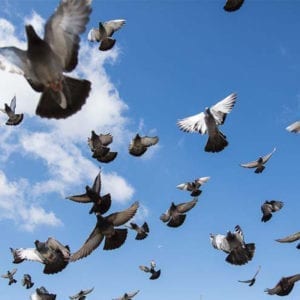
by Ryan Ponto | Sep 26, 2016 | Bird Netting
 Pigeons and planes. You might think that the two should avoid each other, but during the Second World War, the birds acted as crew members on the aircraft. To commemorate that at this year’s Rockton World’s Fair this month, organizer Bill Albers put together a special ceremony.
Pigeons and planes. You might think that the two should avoid each other, but during the Second World War, the birds acted as crew members on the aircraft. To commemorate that at this year’s Rockton World’s Fair this month, organizer Bill Albers put together a special ceremony.
“Pigeons were used in the war as well in Lancaster bombers and that’s how I decided to tie aircraft into the whole picture of pigeons and pigeoneers,” said Albers in an interview with the Flamborough Review.
The Cambridge resident said he wanted to do something to thank the veterans who liberated him and his family when they lived in Holland.
“I visited the (Canadian) Harvard Aircraft Association (CHAA) in Tillsonburg to try and get an idea if they would do a flyover and associated with the war effort,” he said, noting that although it was the second memorial presentation, this was the first time planes were involved.
Harvard trainers took to the sky in a formation and performed three flyovers – one with a smoke trail, one flyover and the missing man formation, in which one plane flies with a smoke trail and breaks away from the others.
“You know how hundreds of aircraft went over to Germany from England and sometimes one of them would get picked off by the Germans? That’s really what that separation indicated. You know, a fallen comrade or comrades.”
Albers noted he thought the veterans in attendance would appreciate the symbolism represented in the flyover.
During the presentation, he spoke to the crowd that included Dutch veterans from Ancaster and Dundas, a NATO vet, the 822 Tutor Squadron of the Royal Canadian Air Cadets and members of the Royal Canadian Legion.
He told them about how grateful he was and told stories about when he was growing up in occupied Holland – like having to eat “black bread” made of flour and sawdust and how the lack of food caused people to starve and resort to stealing.
He also recounted stories about the pigeons that helped the Allies to victory.
“When I saw probably 100 of our veterans…walking to Germany as prisoners of war, some barefooted so they wouldn’t run away, they walked 450 kilometres…that is etched in my mind,” said Albers.
On April 1945, when the First Canadian Army liberated his home country and brought in food supplies, Albers saw tanks and armoured vehicles that rolled into his town and women jumping on them to give the Allied soldiers hugs.
“It has a special meaning for me and I’ve always wanted to do something for the veterans,” he said, noting last year about 40 vets came to the event and were given special parking spaces and received a tour of the fair grounds.
“The vets appreciate the little bit of appreciation that we show and I’m reminded everyday of my freedom here in this country because of it,” Albers added.
Chris Kruter, a private in the Dutch army during the time when East and West Germany were being separated, said he enjoyed the presentation and loved to see the planes fly overhead. Kruter was among a group of Dutch vets from Dundas and Ancaster to be present at the service.
“That was great, you know, it’s special for the older generation,” he said.
Kruter, who grew up below the Rhine River, didn’t experience the hardships like those in the rest of the Netherlands, but did lose family members during the war. In May 1944, his father and sister were killed in a bomb raid. In September of that year, the First Canadian Army moved in and began liberating the country.
“Not until after I lost my dad. That is when…the hardship started,” he said, adding that he moved to Canada in 1965 and now lives in Ancaster.
It’s for these stories and for these vets that Albers felt compelled to hold a special presentation and one he hopes he can continue to present every year.
“For me it’s a great honour to honour the vets,’ he said. “I sometimes say, ‘It’s not about me, it’s about what the vets did’.”
About Pigeon Patrol:
Pigeon Patrol Products & Services is the leading manufacturer and distributor of bird deterrent (control) products in Canada. Pigeon Patrol products have solved pest bird problems in industrial, commercial, and residential settings since 2000, by using safe and humane bird deterrents with only bird and animal friendly solutions. At Pigeon Patrol, we manufacture and offer a variety of bird deterrents, ranging from Ultra-flex Bird Spikes with UV protection, Bird Netting, 4-S Gel and the best Ultrasonic and audible sound devices on the market today.
Voted Best Canadian wholesaler for Bird Deterrent products four years in a row.
Contact Info: 1- 877– 4– NO-BIRD (www.pigeonpatrol.ca)
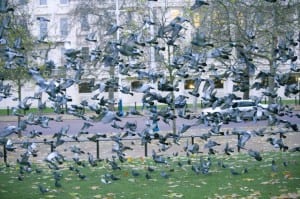
by Ryan Ponto | Sep 25, 2016 | Bird Netting

PIGEONS IN ST JAMES PARK TODAY
. REXMAILPIX.
Kites and pigeons have been banned in the areas around Benazir Bhutto International Airport and Noor Khan Airbase on the directives of the Pakistan Air Force.
Pakistan Air Force issued a draft to the police that kites and pigeons could disrupt the flights to and from the airport as well as the Air Force base.
CPO Israr Abbasi also released orders to the police to ensure strict implementation of the directive. Pigeon cages were also removed from rooftops in the locality.
About Pigeon Patrol:
Pigeon Patrol Products & Services is the leading manufacturer and distributor of bird deterrent (control) products in Canada. Pigeon Patrol products have solved pest bird problems in industrial, commercial, and residential settings since 2000, by using safe and humane bird deterrents with only bird and animal friendly solutions. At Pigeon Patrol, we manufacture and offer a variety of bird deterrents, ranging from Ultra-flex Bird Spikes with UV protection, Bird Netting, 4-S Gel and the best Ultrasonic and audible sound devices on the market today.
Voted Best Canadian wholesaler for Bird Deterrent products four years in a row.
Contact Info: 1- 877– 4– NO-BIRD (www.pigeonpatrol.ca)
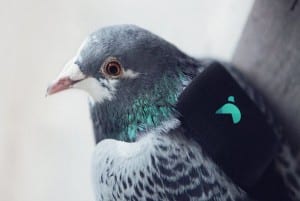
by Ryan Ponto | Sep 24, 2016 | Bird Netting
 Battlefield 1 recently suffered a massive leak, which revealed information about the game’s campaign, weapons, multiplayer modes, pigeon mode, and more. With this and everything else we’ve learned, a video from March has gotten almost everything correct, except for one thing that may not have been announced yet: a pigeon mode.
Battlefield 1 recently suffered a massive leak, which revealed information about the game’s campaign, weapons, multiplayer modes, pigeon mode, and more. With this and everything else we’ve learned, a video from March has gotten almost everything correct, except for one thing that may not have been announced yet: a pigeon mode.
YouTube user AlmightyDaq posted the video before Battlefield 1 was announced. In it, he talked about the game’s maps and modes, all of which were confirmed through announcements. However, the pigeon mode, which sounds like a type of Captue the Flag, has not been confirmed.
“Pigeon functions like a flag that must be held for a certain amount of time before the pigeon flies away towards the base, carrying a message, thus scoring your team a point,” he said. “It’s pretty ridiculous sounding, but take my word for it. Or don’t, and wait until the game is announced or the game mode is shown off.”
This pigeon mode hasn’t been announced or shown off, but some Reddit usersbelieve that the leaked “Possession” game mode is Capture the Pigeon’s official name. We’ve contacted EA to request comment and will update this article as more information is revealed.
Pigeons were used during World War 1 as a way to send messages between bases. During the war, the United States Army used more than 600 pigeons in France.
Battlefield 1 releases for PS4, Xbox One, and PC on October 21.
About Pigeon Patrol:
Pigeon Patrol Products & Services is the leading manufacturer and distributor of bird deterrent (control) products in Canada. Pigeon Patrol products have solved pest bird problems in industrial, commercial, and residential settings since 2000, by using safe and humane bird deterrents with only bird and animal friendly solutions. At Pigeon Patrol, we manufacture and offer a variety of bird deterrents, ranging from Ultra-flex Bird Spikes with UV protection, Bird Netting, 4-S Gel and the best Ultrasonic and audible sound devices on the market today.
Voted Best Canadian wholesaler for Bird Deterrent products four years in a row.
Contact Info: 1- 877– 4– NO-BIRD (www.pigeonpatrol.ca)

by Ryan Ponto | Sep 23, 2016 | Bird Netting

Ideal pigeon cleaning suit.
Health Canada has announced that information on inspections of companies that manufacture pest control products will now be available to the public in an online database.
Canadians can search the Pest Control Registrant Inspections Database for specific inspection findings, as well as summary report cards from inspections and information about companies’ history of compliance with the Pest Control Products Act and its Regulations.
The launch of the Pest Control Products Registrant Inspections Database is a milestone under Health Canada’s Regulatory Transparency and Openness Framework and Action Plan 2015-2018.
“Our government is committed to helping Canadians make informed decisions about the products they buy and use, including pesticides,” said health minister Jane Philpott.
“By providing information from pesticide manufacturers in a publicly searchable way, the Pest Control Registrant Inspections Database can also help Canadians gain a better understanding of how Health Canada conducts inspections and what actions the Department takes if requirements are not being met.”
The plan has made specific commitments to provide Canadians with more information about Health Canada’s health and safety decision-making, including inspection outcomes and inspection ratings. Previously, Health Canada also launched the Drug and Health Product Inspections Database in April 2015.
Quick Facts:
- When conducting inspections of pest control product manufacturers, inspectors check facilities, take samples for testing, and examine documents, such as sales and incident reports.
- If a risk to health or the environment is identified during an inspection, companies are required to take corrective actions.
- The Regulatory Transparency and Openness Framework and Action Plan for 2015-18 outlines concrete steps Health Canada is taking to continually improve public access to timely, useful and relevant health and safety information, while still respecting privacy, confidentiality and security consi
About Pigeon Patrol:
Pigeon Patrol Products & Services is the leading manufacturer and distributor of bird deterrent (control) products in Canada. Pigeon Patrol products have solved pest bird problems in industrial, commercial, and residential settings since 2000, by using safe and humane bird deterrents with only bird and animal friendly solutions. At Pigeon Patrol, we manufacture and offer a variety of bird deterrents, ranging from Ultra-flex Bird Spikes with UV protection, Bird Netting, 4-S Gel and the best Ultrasonic and audible sound devices on the market today.
Voted Best Canadian wholesaler for Bird Deterrent products four years in a row.
Contact Info: 1- 877– 4– NO-BIRD (www.pigeonpatrol.ca)

by Ryan Ponto | Sep 22, 2016 | Bird Netting, Pigeon Patrol's Services

Ideal pigeon cleaning suit.
Health Canada announced Sept. 30 it has launched a new database of inspections of pesticide companies, part of the Government of Canada’s commitment to increased transparency so the public will be protected from unsafe products. Information on inspections of companies that manufacture pest control products are now available to the public online, and Canadians can search the Pest Control Registrant Inspections Database for specific inspection findings, summary report cards from inspections, and information about companies’ history of compliance with the Pest Control Products Act and its Regulations.
The launch “is a milestone under Health Canada’s Regulatory Transparency and Openness Framework and Action Plan 2015-2018,” according to the government, which stated that the plan made specific commitments to provide more information about Health Canada’s health and safety decision-making, including inspection outcomes and inspection ratings.
Health Canada also launched a Drug and Health Product Inspections Database in April 2015. The plan outlines steps Health Canada is taking to continually improve public access to timely, useful, and relevant health and safety information while respecting privacy, confidentiality, and security concerns.
When conducting inspections of pest control product manufacturers, inspectors check facilities, take samples for testing, and examine documents, such as sales and incident reports. If a risk to health or the environment is identified during an inspection, companies are required to take corrective actions.
“Our government is committed to helping Canadians make informed decisions about the products they buy and use, including pesticides. By providing information from pesticide manufacturers in a publicly searchable way, the Pest Control Registrant Inspections Database can also help Canadians gain a better understanding of how Health Canada conducts inspections and what actions the department takes if requirements are not being met,” said Minister of Health Jane Philpott.
About Pigeon Patrol:
Pigeon Patrol Products & Services is the leading manufacturer and distributor of bird deterrent (control) products in Canada. Pigeon Patrol products have solved pest bird problems in industrial, commercial, and residential settings since 2000, by using safe and humane bird deterrents with only bird and animal friendly solutions. At Pigeon Patrol, we manufacture and offer a variety of bird deterrents, ranging from Ultra-flex Bird Spikes with UV protection, Bird Netting, 4-S Gel and the best Ultrasonic and audible sound devices on the market today.
Voted Best Canadian wholesaler for Bird Deterrent products four years in a row.
Contact Info: 1- 877– 4– NO-BIRD (www.pigeonpatrol.ca)
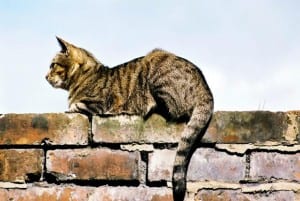
by Ryan Ponto | Sep 21, 2016 | Animal Deterrent Products, Bird Netting, Pigeon Patrol's Services
 ROSEBURG, Ore. — Roseburg animal shelter Saving Grace is starting a program to help control the feral cat population in Douglas County, called Operation Fix ‘Em.
ROSEBURG, Ore. — Roseburg animal shelter Saving Grace is starting a program to help control the feral cat population in Douglas County, called Operation Fix ‘Em.
To help get the program started, Saving Grace got a $10,000 grant from PETCO to fund the operations to spay and neuter the cats, and reduce feral numbers.
“Communities that have been practicing trap-neuter-return of feral cats are slowly over time seeing progress on the issue of community cats in their communities, so this is something we’ve been wanting to do for a long time,” said Executive Director Wendy Kang.
Feral cats sometimes come into the shelter, but often don’t do well in homes. So, Kang said the best option is to catch, fix, and release.
“So, for feral cats, really, their best option is to be able to stay where they are, but not producing more kittens, and creating more problems for humans,” said Kang.
Kang said that in communities like Portland, they’ve been doing this program for 10 years and are seeing their feral population decrease.
Saving Grace’s veterinarian says there’s another benefit as well.
“We’re stopping unwanted cats getting a lot of unhealthy issues at home.. because if you spay and neuter them, you don’t have a lot of cats out there that are going to spread disease amongst themselves,” said Veterinarian Steve Frack.
They’ve fixed 46 cats so far, and have enough money to fix about 240 more.
However, they said they can always use more donations and help with Operation Fix ‘Em.
Kang said, “One of the things we need is more people to volunteer and help us with the trapping. We also need to identify more of the colonies that are in Douglas County.”
If you’d like to volunteer, donate, or adopt an animal, you can call the shelter at (541) 672-3907, and visit their website.
About Pigeon Patrol:
Pigeon Patrol Products & Services is the leading manufacturer and distributor of bird deterrent (control) products in Canada. Pigeon Patrol products have solved pest bird problems in industrial, commercial, and residential settings since 2000, by using safe and humane bird deterrents with only bird and animal friendly solutions. At Pigeon Patrol, we manufacture and offer a variety of bird deterrents, ranging from Ultra-flex Bird Spikes with UV protection, Bird Netting, 4-S Gel and the best Ultrasonic and audible sound devices on the market today.
Voted Best Canadian wholesaler for Bird Deterrent products four years in a row.
Contact Info: 1- 877– 4– NO-BIRD (www.pigeonpatrol.ca)
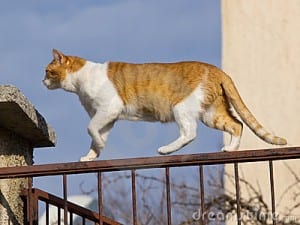
by Ryan Ponto | Sep 20, 2016 | Bird Deterrent Products, Pigeon Patrol's Services, UltraSonic Bird Control
 An inventor from Houston, Texas, has a passion for solving problems, and a serious problem is keeping cats secure during surgery recovery. They need to be restrained so they don’t injure themselves or others, but their stress needs to be minimal. Cats are usually wrapped in towels for this purpose, but this method is inadequate and often results in cats running loose.
An inventor from Houston, Texas, has a passion for solving problems, and a serious problem is keeping cats secure during surgery recovery. They need to be restrained so they don’t injure themselves or others, but their stress needs to be minimal. Cats are usually wrapped in towels for this purpose, but this method is inadequate and often results in cats running loose.
“As a concerned and dedicated animal-protection volunteer, I’d like to offer veterinarians, veterinary technicians and cat owners a better restraint method,” the inventor said. She has designed and created a prototype of her idea.
The patent-pending Kat Wrap allows for the safe, comfortable restraint of a cat while it’s in surgery recovery. It minimizes stress, promotes calmness and maintains warmth. It also prevents self-injury and injury of others, as well as makes it easier for one person to monitor up to seven cats at one time. In addition, the wrap can be used while clipping the cat’s claws.
Producible in different sizes and colors, as well as versions for other animals (such as rabbits), Kat Wrap is a must for anyone who cares for both the safety and well-being of animals. “As a concerned and dedicated animal-protection volunteer, I’d like to offer veterinarians, veterinary technicians and cat owners a better restraint method,” the inventor added, “and I’d like to donate at least 10% of any profits to animal-protection causes and shelters if my idea succeeds.”
The original design was submitted to the Houston office of InventHelp. It is currently available for licensing or sale to manufacturers or marketers. For more information, write Dept. 15-HUN-179, InventHelp, 217 Ninth Street, Pittsburgh, PA 15222, or call (412) 288-1300 ext. 1368.
About Pigeon Patrol:
Pigeon Patrol Products & Services is the leading manufacturer and distributor of bird deterrent (control) products in Canada. Pigeon Patrol products have solved pest bird problems in industrial, commercial, and residential settings since 2000, by using safe and humane bird deterrents with only bird and animal friendly solutions. At Pigeon Patrol, we manufacture and offer a variety of bird deterrents, ranging from Ultra-flex Bird Spikes with UV protection, Bird Netting, 4-S Gel and the best Ultrasonic and audible sound devices on the market today.
Voted Best Canadian wholesaler for Bird Deterrent products four years in a row.
Contact Info: 1- 877– 4– NO-BIRD (www.pigeonpatrol.ca)
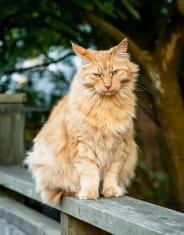
by Ryan Ponto | Sep 19, 2016 | Bird Deterrent Products, Pigeon Spikes
 The Carthage Humane Society is currently experiencing an “MFO” at its Dog Kennel Road location south of town.
The Carthage Humane Society is currently experiencing an “MFO” at its Dog Kennel Road location south of town.
MFO, you ask?
Yep — maximum feline overload.
Jasper County has always had a feral cat problem — just ask any of our local animal control officers about it. Though they do what they can to save these little guys, it’s like plugging a hole in the Hoover Dam with a wad of chewing gum.
Thomas Jay and Mari Sipeer, both with the CHS, are doing everything they can to stay above the fray.
“At the moment, we’ve got about 90 cats in the system,” said Jay. The cats and kittens are scattered between the shelter, a number of area foster homes and the fine folks at the Joplin PetSmart. “We are definitely full here.”
A large majority of the cats inside the shelter are strays, many of them transported to the shelter either by the city’s animal control officer or warm-hearted residents.
“We’ve got a very large feral cat population,” added Sipeer, who’s affectionately known throughout the CHS building as the ‘Cat Lady.’ “They run loose, they breed, they have kittens, people bring them in and we fill up fast.”
In fact: “After four years, I can still remember cats who were here when I came (to CHS), but right now, I’m just doing good to remember all their names.”
Yep, it’s a busy time.
Luckily, the kittens go pretty quickly. After all, the public does love a sweet-faced kitten. In fact, Jay said one of the stray kittens found inside the CHS lobby has already been adopted out to a special person — the very same Carthage animal control officer who brought him to the shelter in the first place.
“He wanted that kitten,” Sipeer said with a smile.
“It does happen once in a while,” added Jay, “that the officer sees an animal that he wants to adopt.”
Sipeer said something similar happened last year when the driver of a rescue wagon began doting on a rescued kitten and decided he just had to have the little fur ball.
“There’s just a little spark that happens between them,” she said.
Most of the cats currently found inside the shelter are strays, Sipeer said, including the two cats I’ll be highlighting in this week’s column. To better illustrate the stray cat problem, the first cat (Caviar) came to the shelter on Sept. 22. The second cat (Cheesecake) came to the shelter on Sept. 23. Both were picked up at opposite ends of town.
Cheesecake is a 1-year-old female. Caviar is a bit younger, sitting at 8 months. Obviously, Sipeer must have had food on her mind when she got around to naming these two young girls.
“I was going down the food list in our name book,” Sipeer said, chuckling. “Somewhere around here is a cat named Chun King. Earlier, I did the liquor names. Over here,” she said, pointing to a sleeping male cat, “is Bahama” — named, I assume, after the Bahama rum. “In most cases, I name the cats.”
Cheesecake is a large, long-haired female with a bit of Maine Coon in her, illustrated by the tufts of hair found sticking from her ears. She also has striking green eyes.
“She’s such a sweet girl,” Sipeer said of Cheesecake. “She’s very cuddly, and she loves to purr and snuggle. She just has a very loving personality.”
Caviar is a bit less outgoing, Sipeer said, though just as affectionate as any other CHS cat. “She’s never given me any problems,” she said of Caviar, as the short-haired cat with black and white markings on her face and body cuddled against Sipeer’s shoulder.
“All my cats here are very good.”
To open your home to Caviar, Cheesecake or any other stray cat or kitten found at this no-kill shelter, visit the Carthage Humane Society at 13860 Dog Kennel Lane, call the shelter at 417-358-6402 or check out the shelter’s Facebook page.
About Pigeon Patrol:
Pigeon Patrol Products & Services is the leading manufacturer and distributor of bird deterrent (control) products in Canada. Pigeon Patrol products have solved pest bird problems in industrial, commercial, and residential settings since 2000, by using safe and humane bird deterrents with only bird and animal friendly solutions. At Pigeon Patrol, we manufacture and offer a variety of bird deterrents, ranging from Ultra-flex Bird Spikes with UV protection, Bird Netting, 4-S Gel and the best Ultrasonic and audible sound devices on the market today.
Voted Best Canadian wholesaler for Bird Deterrent products four years in a row.
Contact Info: 1- 877– 4– NO-BIRD (www.pigeonpatrol.ca)
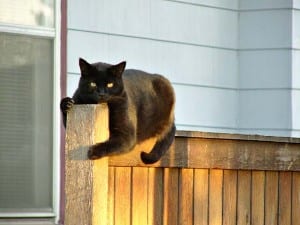
by Ryan Ponto | Sep 17, 2016 | Bird Netting
 The problem of feral cats on Bowen waxes and wanes. Feral cats are intact cats, meaning that they breed. They breed fast, they interbreed, and they breed with family cats that are still intact and allowed to roam free. Intact cats fight with other cats for food, for territory, for shelter. Mostly they do not stay in one place. The male feral cats leave to copulate in other territories and spread their genes. The females leave with their family units to find other territories. In a small community like Bowen, they end up being nuisance cats and cause all kinds of problems.
The problem of feral cats on Bowen waxes and wanes. Feral cats are intact cats, meaning that they breed. They breed fast, they interbreed, and they breed with family cats that are still intact and allowed to roam free. Intact cats fight with other cats for food, for territory, for shelter. Mostly they do not stay in one place. The male feral cats leave to copulate in other territories and spread their genes. The females leave with their family units to find other territories. In a small community like Bowen, they end up being nuisance cats and cause all kinds of problems.
Intact feral cats that wander, as well as cats that are not properly cared for, are more prone to infectious diseases such as Feline Leukemia Virus (FeLV), Feline Upper Respiratory Disease, and Feline Immunodeficiency Virus (FIV). These are horrible diseases and they are easily spread amongst the feline population.
By contrast, healthy, spayed/neutered barn cats who are well fed and have warm, safe shelter are extremely likely to stay put and take care of the vermin problems on the farm or in the stables. Their very presence can deter small critters and most (but not all) will catch and kill rats and mice.
Feral cats typically inbreed, which is very bad for the cats. Inbred cats don’t live long and have more health problems, especially heart disease. And if they are having kittens at just six months old, it stunts the growth. Signs of excessive inbreeding include small litter sizes (i.e. one or two kittens), crooked noses, misaligned jaws, and abnormal eye set.
Sixteen years ago, Bowen had a major problem with feral cats. That’s one of the reasons why C.A.W.E.S. (Coast Animal Welfare & Education Society) came into being in 2000. Because of the vigilance and hard work of many C.A.W.E.S. volunteers over the years, feline infectious disease on Bowen is almost non-existent. The work involved setting up feeding stations to trap the feral cats and then getting them spayed/neutered before releasing them. Some volunteers have given hundreds of hours to tending the feeding stations and trapping the feral cats. BC SPCA is well aware of the problems caused by feral cats and has given support to this work, as has the Municipality. Bowen’s vet, Dr. Westcott, told me that he has noticed a significant decline in the feral population on Bowen Island and attributes this to the persistence and hard work of the C.A.W.E.S. volunteers. He can’t stress enough the importance of spaying and neutering all cats to prevent over-population as well prevention of certain diseases and maintaining individual and herd health.
Particular signs of inbreeding among the Bowen feral cat population were feet with five or six toes and short, misshapen tails, which were dubbed “the Bowen tail”. These tails occurred on about 50% of the cats caught at that time. Many of the cats were already infected with FIV, which means they could easily have been spreading the disease throughout the entire feline population on Bowen.
Sadly, in the past two or three years C.A.W.E.S. has once again started to receive lots of reports of feral cats. These cats don’t come out of nowhere. The only possible conclusion is that there are members of the Bowen community who have intact cats that are allowed to roam free. When female cats leave with their offspring, probably only half of the litter will survive. There have been several reports in the past two years of kittens found dead or dying, which is a clue that inbreeding is taking place and that the momma cats are too young to take proper care of their kittens.
Currently, on Bowen, there is no limitation on the number of cats that a farm owner or anybody else can adopt. Sterilized cats live longer. A good-sized group of sterilized, healthy cats will take care of the vermin problem on a farm for fifteen to twenty years. In fact, there are cats at the original C.A.W.E.S. feeding station (cats who were sterilized many years ago but never found a human family) who are still alive and kicking at sixteen or seventeen years old – and still catching rats and leaving little “gifts” for the volunteers!
About Pigeon Patrol:
Pigeon Patrol Products & Services is the leading manufacturer and distributor of bird deterrent (control) products in Canada. Pigeon Patrol products have solved pest bird problems in industrial, commercial, and residential settings since 2000, by using safe and humane bird deterrents with only bird and animal friendly solutions. At Pigeon Patrol, we manufacture and offer a variety of bird deterrents, ranging from Ultra-flex Bird Spikes with UV protection, Bird Netting, 4-S Gel and the best Ultrasonic and audible sound devices on the market today.
Voted Best Canadian wholesaler for Bird Deterrent products four years in a row.
Contact Info: 1- 877– 4– NO-BIRD (www.pigeonpatrol.ca)
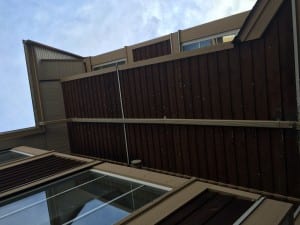
by Ryan Ponto | Sep 16, 2016 | Pigeon Spikes, UltraSonic Bird Control
 Operations staff at the Owen Roberts International Airport are using new equipment – a fogger – to reduce the number of bird at the airport.
Operations staff at the Owen Roberts International Airport are using new equipment – a fogger – to reduce the number of bird at the airport.
According to a statement issued by the Cayman Islands Airports Authority Tuesday, its Operations Department in collaboration with the Safety Office, is now using “an environmentally safe device” to keep the birds away.
The fogger “deploys a light haze of bird repellent that irritates the bird’s mucous membrane,” the Airports Authority officials said.
“The effect doesn’t harm the bird, however, it does create an unpleasant sensation which causes the bird to leave the area,” the statement continued.
Cayman Islands Airports Authority Chief Safety Officer Andrew McLaughlin said the measure had been put in place because bird strikes are a big issue for airports, so “it’s important that we do everything we can to keep birds and other wildlife away from the aerodrome.”
He added, “We are once again in the middle of a very busy bird season, and I am pleased with the way the fogger has been working so far. The fog is harmless and many motorists may also notice a very fragrant grape scent coming from the area where the fogger is located, since it consists of a substance used in flavoring many types of food.”
The Airports Authority is also urging members of the public to do their part in keeping the airport area clear of wildlife by covering trash cans, picking up garbage and not feeding the birds in the areas surrounding the airport.
A Wildlife Hazard Working Group meeting will be held on Monday, Nov. 28 to alert the public to methods the airports authority is using to mitigate wildlife.
About Pigeon Patrol:
Pigeon Patrol Products & Services is the leading manufacturer and distributor of bird deterrent (control) products in Canada. Pigeon Patrol products have solved pest bird problems in industrial, commercial, and residential settings since 2000, by using safe and humane bird deterrents with only bird and animal friendly solutions. At Pigeon Patrol, we manufacture and offer a variety of bird deterrents, ranging from Ultra-flex Bird Spikes with UV protection, Bird Netting, 4-S Gel and the best Ultrasonic and audible sound devices on the market today.
Voted Best Canadian wholesaler for Bird Deterrent products four years in a row.
Contact Info: 1- 877– 4– NO-BIRD (www.pigeonpatrol.ca)
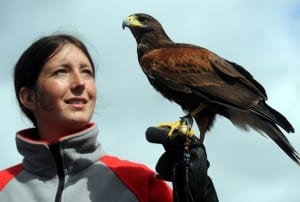
by Ryan Ponto | Sep 15, 2016 | Animal Deterrent Products, Bird Netting
 KANAZAWA, ISHIKAWA PREF. – A falcon takes off in a flurry of motion from the arm of a falconer at Kanazawa Station in Ishikawa Prefecture as tourists stand enthralled.
KANAZAWA, ISHIKAWA PREF. – A falcon takes off in a flurry of motion from the arm of a falconer at Kanazawa Station in Ishikawa Prefecture as tourists stand enthralled.
Surrounding landmarks such as Tsuzumi-mon, a wooden gate in the motif of traditional Japanese hand drums, and a modern glass dome named Motenashi, after the word for hospitality, provide a compelling backdrop for the remarkable exhibition.
Set amid such conspicuous structures, its small wonder that Kanazawa Station was recently lauded for its beauty by a U.S. travel magazine.
“Cool!” one spectator cheered. “Impressive!” commented another.
Though it has all the trappings of a tourist attraction, the avian display is actually driven by a crucial mission: keeping pigeons, and their regular aerial bombardments, away from the station.
Pigeon droppings had been a source of concern for city officials since the dome, which was completed in 2004, was in its design stage. From around 2008, local pigeons began using it to shelter from inclement weather as well as from their enemies. For a city that hosts one of the world’s most beautiful train stations, this was a serious concern.
At first, the city tried nets, then wires and pigeon repellent — all to little effect. Their droppings, meanwhile, continued to sully the buildings and were the scourge of tourists.
In dire straits, a section chief at the city government’s road management department, Masahiro Fujita, consulted with a bird control company managed by a falconer in an attempt to get a handle on the situation. The grand opening of the extended Hokuriku Shinkansen Line was not far off.
From June 2015, trained falcons began to circle Kanazawa Station twice a week, and after two months, the area’s roughly 100 pigeons had disappeared. Each day of patrolling costs ¥30,000, and the city set aside nearly ¥500,000 for the campaign under its budget for the current fiscal year to March 2017.
“No large-scale construction work is needed. It only involves one person and a falcon,” Fujita said, emphasizing the method’s cost efficiency.
To the delight of the local tourism industry, the falconry also proved a hit with visitors to the city of Kanazawa, which is an old castle town.
The falconry is also attracting attention from overseas visitors. Falconer Takayuki Yoshida was questioned and photographed so much that he set up a signboard with an explanation in Japanese and English.
“I like it. It goes well with the atmosphere of the station,” said Satoru Kawauchi, a 36-year-old visitor from Tokyo who watched the patrol.
According to the Japanese Falconers’ Association, a nonprofit organization, falcons have come to carry out a wide range of assignments, including tackling problems with wild bird droppings at factories and reducing the number of aircraft bird strikes. Some falconers have started businesses, an association official said.
About Pigeon Patrol:
Pigeon Patrol Products & Services is the leading manufacturer and distributor of bird deterrent (control) products in Canada. Pigeon Patrol products have solved pest bird problems in industrial, commercial, and residential settings since 2000, by using safe and humane bird deterrents with only bird and animal friendly solutions. At Pigeon Patrol, we manufacture and offer a variety of bird deterrents, ranging from Ultra-flex Bird Spikes with UV protection, Bird Netting, 4-S Gel and the best Ultrasonic and audible sound devices on the market today.
Voted Best Canadian wholesaler for Bird Deterrent products four years in a row.
Contact Info: 1- 877– 4– NO-BIRD (www.pigeonpatrol.ca)
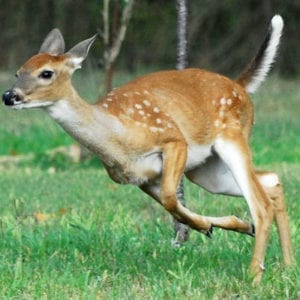
by Ryan Ponto | Sep 14, 2016 | Bird Netting, Pigeon Spikes
 Last week, WIRES rescued an eastern brown snake that had been trapped in netting left on the floor of a garden workshop.
Last week, WIRES rescued an eastern brown snake that had been trapped in netting left on the floor of a garden workshop.
Two snake handlers were required to complete the task, one to hold the head and body of the snake and one to cut the mesh away. Fortunately the snake suffered only minor injury and will be released after some time in care.
Native animals, increasingly displaced from their natural habitat by tree clearing and extreme weather, are resorting to flowering and fruiting trees in our gardens. Tree netting is a popular way to protect fruit from wildlife, but the wrong type can be deadly.
Every year thousands of animals are injured in inappropriate backyard netting or discarded netting. It entangles birds, lizards, snakes, bats and the occasional possum. Hungry animals are easily caught in ‘bird netting’, which has a mesh size greater than 1cm square. Wildlife friendly netting should have a mesh size of less than 5mm. A quick test: If you can poke your finger through the netting space, the mesh size is too big.
If you are using netting in your garden, make sure it is the wildlife friendly type and that it is installed in a way that wildlife do not become entangled. The mesh should be white and have holes smaller than 5mm. There are three wildlife friendly brands of netting: Fruitsaver, Hailguard and Vegenet. Ideally the netting should be tightened over a frame which is clear of the foliage. Netting should be gathered and tied at the base of the tree or drawn tightly to the ground and pegged so that no wildlife can get underneath.
Netting should always be stored in closed bags and disposed of carefully. For further tips, search for ‘wildlife friendly netting’ or have a look at WIRES’ fact sheets on wildlife friendly fencing and wildlife friendly netting.
About Pigeon Patrol:
Pigeon Patrol Products & Services is the leading manufacturer and distributor of bird deterrent (control) products in Canada. Pigeon Patrol products have solved pest bird problems in industrial, commercial, and residential settings since 2000, by using safe and humane bird deterrents with only bird and animal friendly solutions. At Pigeon Patrol, we manufacture and offer a variety of bird deterrents, ranging from Ultra-flex Bird Spikes with UV protection, Bird Netting, 4-S Gel and the best Ultrasonic and audible sound devices on the market today.
Voted Best Canadian wholesaler for Bird Deterrent products four years in a row.
Contact Info: 1- 877– 4– NO-BIRD (www.pigeonpatrol.ca)
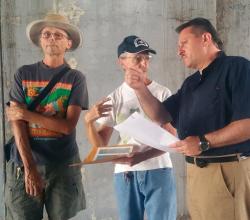
by Ryan Ponto | Sep 13, 2016 | 4-S Gel Bird repellent, Pigeon Patrol's Services
 Two snakes whose writhing encounter in ferny undergrowth at Kembla Heights was captured on video have heralded the start of reptile season.
Two snakes whose writhing encounter in ferny undergrowth at Kembla Heights was captured on video have heralded the start of reptile season.
LET’S DANCE: Two snakes intertwine in a curious scene from amateur video captured at Kembla Heights.
Rachel White noticed the intertwined pair near her Kembla Heights home and posted video of the action as a warning.
WIRES Illawarra reptile co-ordinator Hugh Marriott said the video appeared to show two males locked in combat.
ENSSSNARED: A red-bellied black snake found trapped in bird netting at Kiama makes its displeasure known. Picture: supplied
“They may be trying to force the other into submission, so they can get access to the females that are around,” Mr Marriott said.
But a male-female interaction, akin to foreplay, could not be ruled out.
“If they’re intertwined, not actually biting each other, that’s normally a mating stance,” Mr Marriott said.
“You’ve got to be up close and personal to see that [mating] activity taking place at the end of their tails.”
A snake’s reproductive equipment is located in its cloaca cavity, towards the tip of its tail.
Area reptile handlers have come under increasing demand as recent warmer weather causes snakes, lizards and turtles to end their hibernation.
“We’re coming into that really high-activity period for reptiles, where they’ll stick their heads out looking for food, shelter and a mate,” Mr Marriott said. “We’re fielding calls left, right and centre.”
“Having a pond in your backyard will bring in reptiles because they’re looking for food. They’re attracted to what we provide around our homes.
“Keeping your yard clear of rubbish and having the grass mowed and clear is a good idea.
“If you back onto a bit of bushland or reserve, you’re bound to have visitors who will come into your garden.”
Red-bellied black snakes, diamond pythons and “three or four species that people often mistake for an eastern brown snake” are common in the Illawarra. The region is also home to some small-eyed snakes, golden crowned snakes, black-bellied swamp snakes and tiger snakes.
”They’ve all got to be treated as venomous until proven otherwise,” Mr Marriott said.
“The best action to take is to observe from a distance.
“Never approach or try to kill or capture them, because 90 per cent of people get bitten if they try any of those actions.”
Snake activity can remain high until the end of April, when reptiles will start to bunker down for the winter.
Mr Marriott traveled to Hothersal Street, Kiama on Thursday afternoon to tend to a 1.3-metre red-bellied black snake that had become ensnared in bird netting.
He found the creature healthy and highly agitated. It was eventually freed in Albion Park, with the help of a wildlife rescue volunteer.
About Pigeon Patrol:
Pigeon Patrol Products & Services is the leading manufacturer and distributor of bird deterrent (control) products in Canada. Pigeon Patrol products have solved pest bird problems in industrial, commercial, and residential settings since 2000, by using safe and humane bird deterrents with only bird and animal friendly solutions. At Pigeon Patrol, we manufacture and offer a variety of bird deterrents, ranging from Ultra-flex Bird Spikes with UV protection, Bird Netting, 4-S Gel and the best Ultrasonic and audible sound devices on the market today.
Voted Best Canadian wholesaler for Bird Deterrent products four years in a row.
Contact Info: 1- 877– 4– NO-BIRD (www.pigeonpatrol.ca)
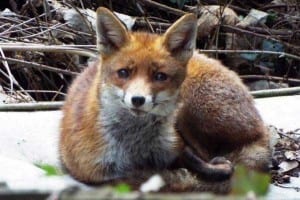
by Ryan Ponto | Sep 12, 2016 | 4-S Gel Bird repellent, Pigeon Patrol's Services
 DEAR JOAN: We hope you can advise us on a problem. We live in the city and have a metal, flat roof garden building that raccoons or opossums are using as a bathroom.
DEAR JOAN: We hope you can advise us on a problem. We live in the city and have a metal, flat roof garden building that raccoons or opossums are using as a bathroom.
We also have a small wood utility shed — seldom used — that rats now call home. We have trapped some but in a few weeks, more move in. Any suggestions for a permanent fix on either problem, or is there one?
Lou Cobb, Livermore
DEAR LOU: The problem on your shed is likely raccoons. For some reason, they like creating latrines up off the ground.
It doesn’t really matter which one is doing it — either way, the stuff is toxic and you should be careful when removing it.
Wear gloves and a respirator, and bag up the poop for the garbage. To keep them off, try taking some coffee cans — do they even make those anymore? — or some sort of container. Punch several holes in the side of the container and put some rags soaked in amonia inside, then put the lid on. Set these on top of the roof.
As for the rats, people get very determined to kill them, but as you have experienced, there are plenty of others to take their place. You need to find where they are getting into the shed and then patch holes and block entrances.
Because the shed is wooden, it might be more difficult to keep them from chewing their way in. If that’s happening, consider putting siding or even metal flashing on the building to stop the gnawing.
You should also take a look at your yard and remove anything that makes it attractive to critters, including pet food left out over night, water bowls and heavy ground covers, especially ivy. Keeping them out of your yard is the first step to keeping them out of your shed and off your roof.
DEAR JOAN: I so enjoy your column but was quite dismayed today to see the letter from about using bird netting to stop skunks from digging.
I do hope the writer is using the wildlife-friendly netting instead of the standard netting that is available in most hardware stores. That type of netting can be deadly to to our local wildlife: birds, lizards, snakes and even bats can get tangled in the netting and are unable to escape, often injuring themselves.
At Lindsay Wildlife Experience, the aquatic garter snake, Ribbon, was a victim of that kind of netting. Some of his ribs were broken, making it impossible for him to survive in the wild. He serves as an animal ambassador, allowing our exhibit hall interpreters to tell his story so more people are aware of the dangers of standard garden netting.
I am writing as a concerned citizen and not as a representative of Lindsay Wildlife, although I do volunteer there and appreciate the opportunity to tell Ribbon’s story.
Marni Berendsen, Bay Area
DEAR MARNI: I was aware of the dangers of monofilament bird netting, but I didn’t think about it being a concern lying flat on the ground. But you are, of course, correct.
Creatures can become tangled in the netting, and if they are unable to free themselves, they can starve to death. They also can cut their mouths trying to chew through it, and break bones, as was the case with Ribbon, in their attempts at escape.
If you’re planning to use netting to protect trees, gardens or as a cover on lawns to prevent creatures from digging for grubs, look for types certified as wildlife safe.
Thanks for the reminder, Marni .
About Pigeon Patrol:
Pigeon Patrol Products & Services is the leading manufacturer and distributor of bird deterrent (control) products in Canada. Pigeon Patrol products have solved pest bird problems in industrial, commercial, and residential settings since 2000, by using safe and humane bird deterrents with only bird and animal friendly solutions. At Pigeon Patrol, we manufacture and offer a variety of bird deterrents, ranging from Ultra-flex Bird Spikes with UV protection, Bird Netting, 4-S Gel and the best Ultrasonic and audible sound devices on the market today.
Voted Best Canadian wholesaler for Bird Deterrent products four years in a row.
Contact Info: 1- 877– 4– NO-BIRD (www.pigeonpatrol.ca)
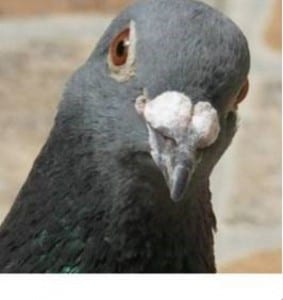
by Ryan Ponto | Sep 11, 2016 | Bird Deterrent Products, Pigeon Patrol's Services
 So much so, that any gulls in the area scatter in fear as soon as they get a glimpse of the black and white falcon.
So much so, that any gulls in the area scatter in fear as soon as they get a glimpse of the black and white falcon.
“It’s all about the balance of nature,” said Everett, a falconer with Falcon Environmental Services.
“He’s a natural predator and the seagulls know that. When they see him, this area becomes unattractive to them.”
Hornblower Niagara Cruises has contracted services from Falcon Environmental Services for the past two years after it added food and beverage services to its lower deck along the Niagara River.
“Wherever you have an attraction, there’s typically gulls that follow the folks around follow the food and they can make quite the mess,” said Mory DiMaurizo.
When Hornblower first launched ed its food and beverage services, they also installed signs asking guests to not feed the birds.
When the pesky gulls continued to gather en masse on the deck area, staff looked for another solution to discourage the winged intruders and birds of prey have proven to be a highly effective yet non-invasive method of seagull control.
Bullet, a 10-year-old hybrid of a Saker falcon and a gyrfalcon, never has to leave his handler’s side. His presence alone is enough to deter the gulls.
“The birds don’t fly, he’s used as a deterrent and it’s 100 per cent effective,” DeMaurizo said. “The bird is there to create a bubble of awareness around us so that the gulls know this is not an area they want to go in.”
Everett and his raptor companion are also a hit with guests, who are eager to find out why they’re spending time at a tourist attraction.
“I’ve met some incredibly interesting people from all over the world,” he said. “I bet Bullet’s photo is on a lot of Facebook pages.”
DiMaurizo said the duo has been especially popular with international tourists.
“In the Middle East and Asia, falconry is a huge sport that many people are interested in.”
Based out of Alexandria, Ont., Falcon Environmental Services also provides bird control at several Canadian military bases as well as a number of landfill sites in New Jersey.
It has been in charge of wildlife management at Toronto’s Pearson International Airport for almost 20 years.
About Pigeon Patrol:
Pigeon Patrol Products & Services is the leading manufacturer and distributor of bird deterrent (control) products in Canada. Pigeon Patrol products have solved pest bird problems in industrial, commercial, and residential settings since 2000, by using safe and humane bird deterrents with only bird and animal friendly solutions. At Pigeon Patrol, we manufacture and offer a variety of bird deterrents, ranging from Ultra-flex Bird Spikes with UV protection, Bird Netting, 4-S Gel and the best Ultrasonic and audible sound devices on the market today.
Voted Best Canadian wholesaler for Bird Deterrent products four years in a row.
Contact Info: 1- 877– 4– NO-BIRD (www.pigeonpatrol.ca)

by Ryan Ponto | Sep 10, 2016 | Animal Deterrent Products, Bird Netting
 Dustin A. Duffy, 28, of San Angelo, was arrested on multiple charges after he ran from San Angelo Police Sunday evening, according to a news release.
Dustin A. Duffy, 28, of San Angelo, was arrested on multiple charges after he ran from San Angelo Police Sunday evening, according to a news release.
Police were dispatched to the 3200 block of Guadalupe Street around 6:40 p.m. for the report of unwanted subjects on church property, according to the release. When officers arrived, Duffy, ran from police and jumped a fence at a residence in the 3200 block of San Antonio Street. Officers pursued and watched Duffy jump another fence into a neighboring backyard, according to the San Angelo Police Department.
Duffy was located hiding in a backyard next to a shed. He was taken into custody without incident, according to SAPD. Duffy was charged with two counts of criminal trespass, evading arrest detention with prior conviction, possession of controlled substance Penalty Group 3, and an outstanding parole violation warrant. He was transported to the Tom Green County Jail without incident.
The second subject, a 31-year-old San Angelo man, was cooperative and released from the scene, according to SAPD.
About Pigeon Patrol:
Pigeon Patrol Products & Services is the leading manufacturer and distributor of bird deterrent (control) products in Canada. Pigeon Patrol products have solved pest bird problems in industrial, commercial, and residential settings since 2000, by using safe and humane bird deterrents with only bird and animal friendly solutions. At Pigeon Patrol, we manufacture and offer a variety of bird deterrents, ranging from Ultra-flex Bird Spikes with UV protection, Bird Netting, 4-S Gel and the best Ultrasonic and audible sound devices on the market today.
Voted Best Canadian wholesaler for Bird Deterrent products four years in a row.
Contact Info: 1- 877– 4– NO-BIRD (www.pigeonpatrol.ca)

 Jammu, October 16, (Scoop News)-District authorities in Jammu ordered a probe after an Non Governmental organization (NGO), SAVE (Save animals; value Environment) conveyed that the pigeons handed over to them had rings attached to their feet and some suspicious things were written on their feathers.
Jammu, October 16, (Scoop News)-District authorities in Jammu ordered a probe after an Non Governmental organization (NGO), SAVE (Save animals; value Environment) conveyed that the pigeons handed over to them had rings attached to their feet and some suspicious things were written on their feathers.

 The search is on for new owners brave enough to take it on haunted inn.
The search is on for new owners brave enough to take it on haunted inn.
 I was reading a story in a magazine not too long ago that referred to eating pigeons. I guess back in the good old days eating pigeons or squab was as natural as eating quail or pheasant. I am glad that I did not get to participate in that ritual! I just don’t have an urge to dine on a pigeon.
I was reading a story in a magazine not too long ago that referred to eating pigeons. I guess back in the good old days eating pigeons or squab was as natural as eating quail or pheasant. I am glad that I did not get to participate in that ritual! I just don’t have an urge to dine on a pigeon.
 A branch of McDonald’s has been closed in Hull and it appears to have had an unexpected effect on the city’s population of crows.
A branch of McDonald’s has been closed in Hull and it appears to have had an unexpected effect on the city’s population of crows.
 Pigeons and planes. You might think that the two should avoid each other, but during the Second World War, the birds acted as crew members on the aircraft. To commemorate that at this year’s Rockton World’s Fair this month, organizer Bill Albers put together a special ceremony.
Pigeons and planes. You might think that the two should avoid each other, but during the Second World War, the birds acted as crew members on the aircraft. To commemorate that at this year’s Rockton World’s Fair this month, organizer Bill Albers put together a special ceremony.


 Battlefield 1 recently suffered a massive leak, which revealed information about the game’s campaign, weapons, multiplayer modes, pigeon mode, and more. With this and everything else we’ve learned, a video from March has gotten almost everything correct, except for one thing that may not have been announced yet: a pigeon mode.
Battlefield 1 recently suffered a massive leak, which revealed information about the game’s campaign, weapons, multiplayer modes, pigeon mode, and more. With this and everything else we’ve learned, a video from March has gotten almost everything correct, except for one thing that may not have been announced yet: a pigeon mode.


 ROSEBURG, Ore. — Roseburg animal shelter Saving Grace is starting a program to help control the feral cat population in Douglas County, called Operation Fix ‘Em.
ROSEBURG, Ore. — Roseburg animal shelter Saving Grace is starting a program to help control the feral cat population in Douglas County, called Operation Fix ‘Em.
 An inventor from Houston, Texas, has a passion for solving problems, and a serious problem is keeping cats secure during surgery recovery. They need to be restrained so they don’t injure themselves or others, but their stress needs to be minimal. Cats are usually wrapped in towels for this purpose, but this method is inadequate and often results in cats running loose.
An inventor from Houston, Texas, has a passion for solving problems, and a serious problem is keeping cats secure during surgery recovery. They need to be restrained so they don’t injure themselves or others, but their stress needs to be minimal. Cats are usually wrapped in towels for this purpose, but this method is inadequate and often results in cats running loose.
 The Carthage Humane Society is currently experiencing an “MFO” at its Dog Kennel Road location south of town.
The Carthage Humane Society is currently experiencing an “MFO” at its Dog Kennel Road location south of town.
 The problem of feral cats on Bowen waxes and wanes. Feral cats are intact cats, meaning that they breed. They breed fast, they interbreed, and they breed with family cats that are still intact and allowed to roam free. Intact cats fight with other cats for food, for territory, for shelter. Mostly they do not stay in one place. The male feral cats leave to copulate in other territories and spread their genes. The females leave with their family units to find other territories. In a small community like Bowen, they end up being nuisance cats and cause all kinds of problems.
The problem of feral cats on Bowen waxes and wanes. Feral cats are intact cats, meaning that they breed. They breed fast, they interbreed, and they breed with family cats that are still intact and allowed to roam free. Intact cats fight with other cats for food, for territory, for shelter. Mostly they do not stay in one place. The male feral cats leave to copulate in other territories and spread their genes. The females leave with their family units to find other territories. In a small community like Bowen, they end up being nuisance cats and cause all kinds of problems.
 Operations staff at the Owen Roberts International Airport are using new equipment – a fogger – to reduce the number of bird at the airport.
Operations staff at the Owen Roberts International Airport are using new equipment – a fogger – to reduce the number of bird at the airport.
 KANAZAWA, ISHIKAWA PREF. –
KANAZAWA, ISHIKAWA PREF. – 
 Last week, WIRES rescued an eastern brown snake that had been trapped in netting left on the floor of a garden workshop.
Last week, WIRES rescued an eastern brown snake that had been trapped in netting left on the floor of a garden workshop.
 Two snakes whose writhing encounter in ferny undergrowth at Kembla Heights was captured on video have heralded the start of reptile season.
Two snakes whose writhing encounter in ferny undergrowth at Kembla Heights was captured on video have heralded the start of reptile season.
 DEAR JOAN: We hope you can advise us on a problem. We live in the city and have a metal, flat roof garden building that raccoons or opossums are using as a bathroom.
DEAR JOAN: We hope you can advise us on a problem. We live in the city and have a metal, flat roof garden building that raccoons or opossums are using as a bathroom.
 So much so, that any gulls in the area scatter in fear as soon as they get a glimpse of the black and white falcon.
So much so, that any gulls in the area scatter in fear as soon as they get a glimpse of the black and white falcon.
 Dustin A. Duffy, 28, of San Angelo, was arrested on multiple charges after he ran from San Angelo Police Sunday evening, according to a news release.
Dustin A. Duffy, 28, of San Angelo, was arrested on multiple charges after he ran from San Angelo Police Sunday evening, according to a news release.